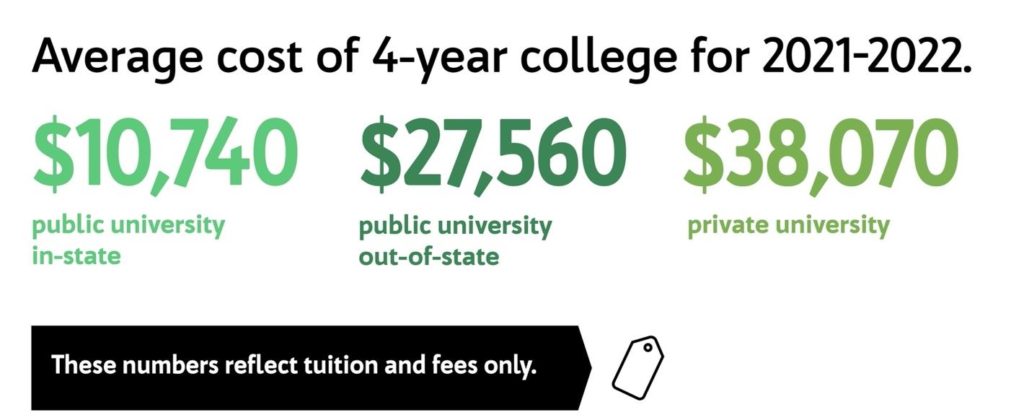Your kids’ college: How much will it cost?
In financial planning, people love to ask what their “number” is for retirement. One of the most frequently asked questions is: How much do I need to have in order to retire?
A lesser-asked question is: How much do I need to save to pay for my kids’ college? This is a complicated question for many reasons. The answer depends on how many kids you have, where they choose to study, and how much of their education you want to pay for. That last question is particularly important, since redirecting money toward a college fund can have a significant impact on any other goals you may have, including retirement.
These are all personal questions that we cover in our planning meetings. But knowing how much college may cost in the future can help make those conversations more productive. Just like investment performance, current and past prices can’t be used to predict the future. But they create a helpful framework.

It wouldn’t make sense to talk about the cost of college and only look at tuition and fees. However, those costs tend to be fixed, whereas housing and other expenses may offer opportunities to save.
Additional expenses are also an area where some parents might ask the student to contribute, via work study programs or an off-campus job. Some students may even elect to live at home, depending on where they choose to go to school.

Where your child(ren) decide to go to school can also affect the overall cost. Up until now, we’ve been using national averages, but costs vary significantly by state. In fact, attending a public university out of state could cost as much as a private university in some areas.

Trends in pricing also vary by state. For instance, in 2022 the cost to attend a California public university in-state was actually less than in 2017—prices fell over that five-year period.
Of course, no one can predict whether college costs will continue to trend down in California; nationwide, costs are increasing. In general, the College Board predicts college prices will inflate at a rate of 5% per year—higher than the historical rate of inflation. It’s unclear how changes in consumer prices might play out in education.
To help you get a sense for what college might cost when your kids are ready to attend, we took the current prices and assumed a 5% increase each year. Based on that math—which is intended to be illustrative and not used as a prediction—here’s what four years of college may cost in the future:

As we start to think about how you may want to build your kids’ college education into your financial plan, these numbers can be a helpful guide. But having a rough estimate isn’t everything. We’ll also want to cover your current circumstances, consider your other goals, look at your timeframe, and more.
As with every big financial decision, deciding how to pay for college involves trade-offs. We can help you walk through the different factors at play and build a plan customized to you.
Content in this material is for general information only and is not intended to provide specific advice or recommendations for any individual.
